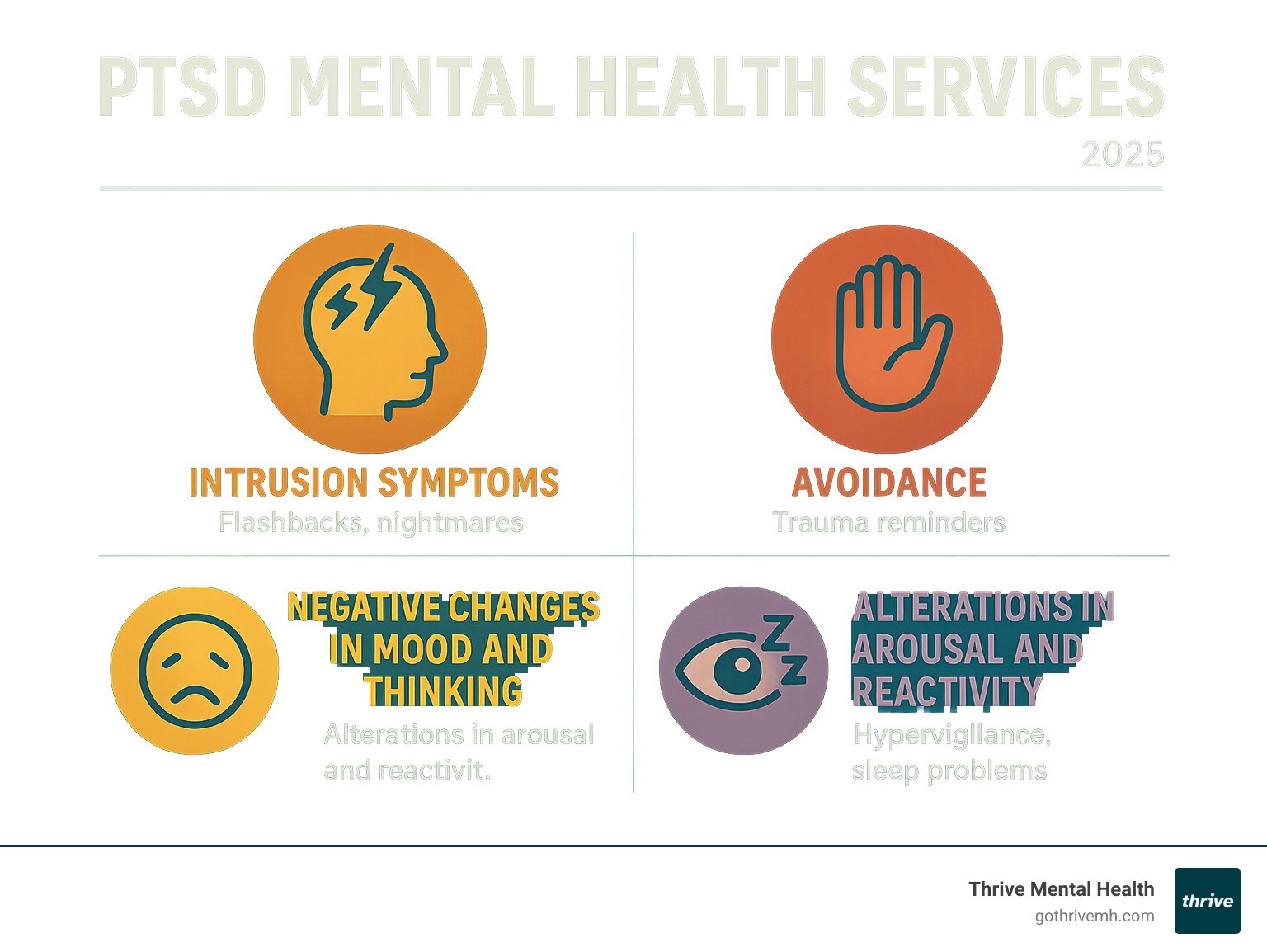Where to Find Help for PTSD: A Comprehensive Service Directory

PTSD mental health services: 2025 Healing Guide
Finding Hope After Trauma: Your Path to Recovery Starts Here
PTSD mental health services offer a lifeline for trauma survivors ready to heal. From crisis support via the 988 Lifeline to intensive virtual programs (IOP and PHP), individual therapy, and support groups, the right help is available for your specific needs.
Post-traumatic stress disorder (PTSD) affects about 4% of U.S. adults after they experience or witness a life-threatening event. But recovery is absolutely possible. Effective treatments exist to help you manage symptoms like flashbacks and hypervigilance and reclaim your life.
This guide will help you steer trauma treatment options, understand different levels of care, and find resources that fit your schedule. You are not alone; millions have found healing through evidence-based care.
As CEO of Thrive Mental Health, I’m Nate Raine. I’ve dedicated my career to expanding access to behavioral health services, including specialized PTSD care for busy professionals across Florida. My experience has shown me that flexible, expert-led treatment can transform lives, even for those with the most demanding schedules.

Related content about PTSD mental health services:
Understanding PTSD: Symptoms, Causes, and Diagnosis
Post-Traumatic Stress Disorder (PTSD) is a mental health condition that can develop after a frightening or life-threatening event. While most people recover naturally from trauma, PTSD occurs when the brain gets “stuck” in its processing, leading to persistent symptoms. About 6% of U.S. adults will experience PTSD in their lifetime. Traumatic events can include accidents, assaults, natural disasters, or witnessing violence. Risk factors like previous trauma or lack of a support system can increase vulnerability, while protective factors like strong relationships and good coping skills can foster resilience. For a deeper look, see our Beginners Guide to Understanding Trauma.
Differentiating PTSD from Normal Stress Reactions
Feeling upset after trauma is normal. The key difference between a normal stress reaction and PTSD lies in duration and severity. Normal stress responses usually improve within a few weeks. With PTSD, symptoms last for months and disrupt daily life. Acute Stress Disorder has similar symptoms but occurs within the first month after trauma, making early intervention key. Adjustment Disorder involves difficulty coping with a stressful event but with less severe symptoms that typically resolve within six months. Professional evaluation is essential to distinguish these conditions. Learn more in our article: How PTSD Impacts Daily Life: The Role of Flashbacks, Avoidance, and Anxiety.
Common Symptoms of PTSD
PTSD symptoms fall into four main categories:
- Intrusion symptoms: Unwanted memories, distressing nightmares, and flashbacks that make you feel like the trauma is happening again.
- Avoidance behaviors: Actively avoiding people, places, or conversations that remind you of the trauma, which can lead to isolation.
- Negative changes in mood and thinking: Persistent feelings of fear, guilt, or shame. You might feel detached from others or lose interest in activities you once enjoyed.
- Changes in arousal and reactivity: Being in a constant state of high alert (hypervigilance), startling easily, having angry outbursts, or struggling with sleep and concentration.
Some people also experience dissociative symptoms, like feeling detached from their body or reality. Comprehensive PTSD mental health services address all these symptoms. Read more in our article on Understanding the Symptoms Associated with PTSD.
How PTSD is Professionally Diagnosed
An accurate PTSD diagnosis requires a mental health professional. The process typically involves a mental health evaluation to discuss your experiences and symptoms, a physical exam to rule out other medical conditions, and use of the DSM-5 criteria for diagnostic accuracy. Professional assessment is vital because PTSD often co-occurs with depression, anxiety, or substance use issues. A thorough evaluation identifies all issues, leading to a more effective treatment plan. While online screenings are helpful, they cannot replace a professional diagnosis from a qualified clinician, such as the Florida-licensed therapists at Thrive Mental Health. For more details, visit the American Psychiatric Association’s guide on What is Posttraumatic Stress Disorder (PTSD)?.
Evidence-Based Treatments for Healing Trauma
The most important thing to know is that PTSD is treatable, and recovery is possible. At Thrive Mental Health, our trauma-informed care approach recognizes that trauma affects every part of your life. We create individualized treatment plans because each person’s journey is unique. The most effective PTSD mental health services often combine psychotherapy to process the trauma with medication to manage severe symptoms. For a deeper dive, see our guide to the Top 5 Effective Treatments for PTSD.
Psychotherapy: The Cornerstone of PTSD Treatment
Psychotherapy is the cornerstone of healing. Key evidence-based therapies include:
- Cognitive Behavioral Therapy (CBT): Helps you identify and change negative thought patterns and behaviors related to the trauma.
- Prolonged Exposure (PE) Therapy: Gradually and safely helps you confront trauma-related memories and situations to reduce their power.
- Eye Movement Desensitization and Reprocessing (EMDR): Uses bilateral stimulation (like eye movements) to help the brain reprocess traumatic memories, making them less distressing. Learn more in our article Exploring EMDR Therapy Techniques for Trauma Recovery.
- Trauma-Focused Cognitive Behavioral Therapy (TF-CBT): An adaptation specifically for children and adolescents.
- Somatic Therapy: Addresses how trauma is stored in the body, helping to release physical tension and stress.
All these therapies are available through Thrive’s specialized trauma-focused programs.
The Role of Medication in Managing Symptoms
Medication is not a cure for PTSD, but it can be a valuable tool. It can reduce severe symptoms like anxiety and depression, giving you the stability needed to engage fully in therapy. SSRIs and SNRIs (antidepressants) are most commonly prescribed. At Thrive, our therapists and prescribers coordinate closely to ensure your medication supports your therapy goals. The right approach is personalized for you. Read our guide on Medications for PTSD: What to Know.
PTSD in Special Populations: Children and Veterans
Certain groups require specialized care. Childhood trauma can impact a child’s development, making early intervention with age-appropriate techniques crucial. Our article on Overcoming Childhood Trauma: Healing Into Adulthood offers valuable insights. Veterans often face complex trauma from combat and military service. While Thrive is not a VA facility, our programs offer flexible, evidence-based care that can complement or serve as an alternative for veterans in Florida. For more resources, see our guide to PTSD Support for Veterans in Florida.
A Directory for Finding PTSD Mental Health Services

Finding the right PTSD mental health services can feel daunting, but knowing your options makes it manageable. Navigating care can be tricky, especially with insurance, so it’s important to understand your benefits and explore all available resources. At Thrive Mental Health, our programs are designed to be accessible and effective, removing common barriers to care. For comprehensive guidance, consult the PTSD Official Guidelines for Treatment and Management Options.
Types of PTSD Mental Health Services Available
You may work with psychiatrists (who can prescribe medication), psychologists, or licensed therapists. The level of care depends on your needs. While weekly therapy is common, some people need more support. Intensive Outpatient Programs (IOP) offer multiple therapy sessions per week while you live at home. Thrive’s Virtual IOPs are designed for busy professionals in Florida, offering expert-led, flexible care. We also offer Partial Hospitalization Programs (PHP) for more intensive support. Our virtual model makes these specialized services accessible from anywhere in Florida. Explore Thrive’s Trauma-Focused IOP in Florida.
How to Find Local PTSD Mental Health Services in Florida
To find local PTSD mental health services in Florida, you can use online directories like Psychology Today, contact community mental health centers for affordable care, or ask your primary care doctor for a referral. Always check your insurance provider’s directory for in-network options. Government resources like SAMHSA’s treatment locator and the National Center for PTSD are also valuable. Thrive Mental Health serves clients throughout Florida with our virtual programs, eliminating travel stress and providing access to specialized care whether you’re in Miami, Tampa, or a smaller community. Find Trauma and PTSD Therapists in Florida with Thrive.
Crisis Support and Immediate Help
If you are in crisis or having thoughts of harming yourself, please seek immediate help. You are not alone.
- The 988 Suicide & Crisis Lifeline is available 24/7. Call or text 988, or visit the 988 Lifeline.
- Veterans can call 988 and press 1 to reach the Veterans Crisis Line.
- In any life-threatening emergency, call 911 or go to the nearest emergency room.
While Thrive Mental Health is not a crisis service, our programs provide the long-term support needed for recovery after a crisis is stabilized. You can Contact Thrive Mental Health to learn about our programs.
Building Your Support System Beyond Professional Care

While professional PTSD mental health services are essential, a strong personal support system is equally vital for long-term recovery. This includes peer connections, family involvement, and self-care strategies that reinforce therapeutic progress. Learn more in Post Traumatic Disorder Recovery Strategies and Support.
How Family and Friends Can Help
Supporting a loved one with PTSD is invaluable. Here’s how you can help:
- Educate Yourself: Learn about PTSD to understand their behavior.
- Listen Without Judgment: Be available to listen when they’re ready, without offering unsolicited advice.
- Respect Boundaries: Understand their need for personal space and don’t pressure them into activities.
- Encourage Professional Help: Gently suggest they seek help and offer support in finding it.
- Prioritize Your Own Self-Care: You cannot pour from an empty cup. Seek support for yourself if needed.
If you are worried about their immediate safety, call the 988 Suicide & Crisis Lifeline.
The Power of Peer Support Groups
Connecting with others who have similar experiences is incredibly validating. Peer support groups reduce isolation by providing a safe community where you can share stories, learn coping strategies, and build a sense of solidarity. You can find groups through organizations like the Anxiety & Depression Association of America (ADAA). At Thrive Mental Health, we can also guide you to peer support resources in Florida. To find local groups, visit Find a Support Group with Thrive.
Frequently Asked Questions about PTSD Services
What are the long-term effects of untreated PTSD?
Untreated PTSD can have long-term ripple effects. It significantly increases the risk of co-occurring disorders like depression, anxiety, and substance use problems. Relationships can become strained due to emotional numbness and social avoidance. The chronic stress also takes a physical toll, contributing to health issues like heart problems and chronic pain. Daily functioning at work or school can suffer due to poor concentration and sleep. The good news is that these effects are not permanent. With proper PTSD mental health services, like the virtual programs available to all Florida residents through Thrive Mental Health, healing is possible. Learn more in Healing from PTSD: Overcoming Traumatic Experiences.
What is the difference between PTSD and Complex PTSD (C-PTSD)?
Traditional PTSD usually results from a single traumatic event (like an accident or assault). Complex PTSD (C-PTSD) stems from prolonged, repeated trauma where escape was difficult or impossible (like childhood abuse or domestic violence). In addition to standard PTSD symptoms, C-PTSD often involves profound difficulties with emotional regulation, relationships, and a deeply negative self-concept. Treatment for C-PTSD is often more extensive, addressing these developmental and relational impacts. Thrive Mental Health’s trauma-focused services in Florida are designed to address the nuances of both PTSD and C-PTSD. For more information, explore Effective Complex PTSD Counselling Strategies and Support.
How does virtual therapy for PTSD work?
Virtual therapy has revolutionized PTSD mental health services. Using a secure video platform, you can attend sessions from the comfort and safety of your own home—an environment you control, which is crucial when discussing trauma. It eliminates geographical barriers, giving anyone in Florida access to specialized therapists. The flexibility makes it easier to maintain consistent treatment around your work and life commitments. Research shows virtual therapy is just as effective as in-person care for PTSD, and our clinicians at Thrive Mental Health are experts at building strong therapeutic connections through the screen. Learn more in Revolutionizing PTSD Care: Benefits of Virtual Intensive Outpatient Programs and Online DBT.
Take the First Step Towards Healing Today
Reading about trauma and PTSD mental health services takes courage. We want you to know that recovery is possible. This journey is not just about managing symptoms—it’s about reclaiming your life, your relationships, and your future.
Seeking help is a sign of profound strength. At Thrive Mental Health, we understand the challenges of taking that first step. Our virtual trauma-focused intensive outpatient programs were designed for busy people across Florida. You can access expert-led, evidence-based care from the comfort of your own space, on a schedule that works for you.
Hope for the future is real. Our team of Florida-licensed trauma specialists is here to walk alongside you on your path to healing.
You deserve to feel safe and hopeful again.
Ready to take that brave first step? Explore our virtual trauma-focused IOP programs and find how we can help you build a foundation for lasting recovery.

